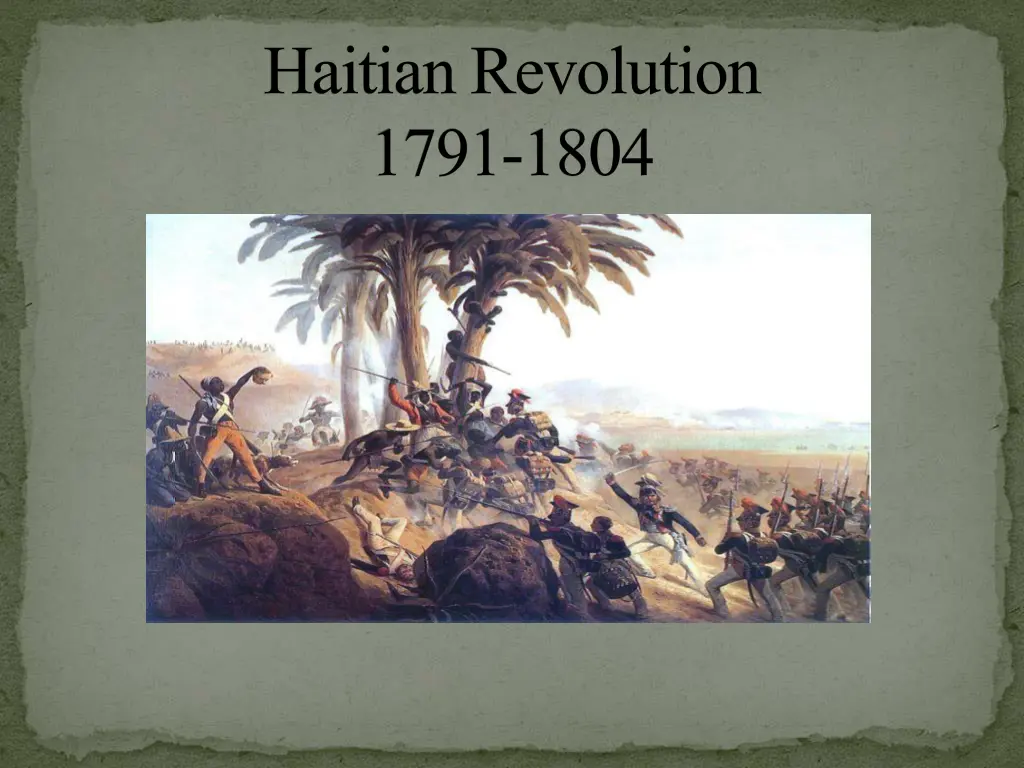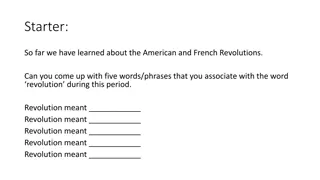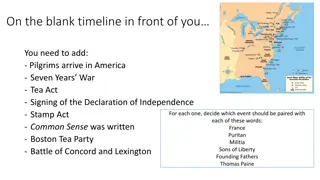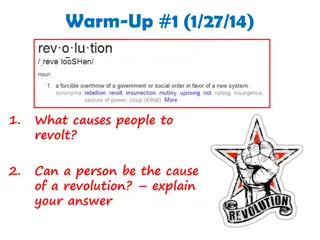
Impact of the Haitian Revolution on Equality and Independence
Explore the Haitian Revolution of 1791-1804, where enslaved Africans in Saint Domingue fought for freedom inspired by American and French revolutions. Led by Toussaint L'Ouverture, Haiti became the second independent nation in the Americas. The revolution brought about profound social, political, and economic changes, making all citizens equal regardless of color or race. Discover how the French Revolution played a crucial role in this historic event, and how Haiti successfully maintained control against French forces.
Download Presentation

Please find below an Image/Link to download the presentation.
The content on the website is provided AS IS for your information and personal use only. It may not be sold, licensed, or shared on other websites without obtaining consent from the author. If you encounter any issues during the download, it is possible that the publisher has removed the file from their server.
You are allowed to download the files provided on this website for personal or commercial use, subject to the condition that they are used lawfully. All files are the property of their respective owners.
The content on the website is provided AS IS for your information and personal use only. It may not be sold, licensed, or shared on other websites without obtaining consent from the author.
E N D
Presentation Transcript
Haitian Revolution 1791-1804
Exporting Revolutionary Ideas In 1791, the ideals of the American and French Revolutions traveled across the Atlantic and the Caribbean to the French-held colony of Saint Domingue on the island of Hispaniola. Inspired by talk of freedom, enslaved Africans took up arms. Led by a formerly enslaved man Toussaint- L Ouverture, and other island leaders, the rebels fought for thirteen years against the French.
1.1 On January 1, 1804, Saint Domingue, present-day Haiti, became the second nation in the Americas to achieve independence from colonial rule. http://www.latinamericanstudies.org/haiti/toussaint-3.jpg L Ouverture, can be considered as one of Haiti s founding fathers. Political and intellectual revolutions changed the way people thought about established ideas and institutions.
1.1 Thirteen years of War A colony of exploited slaves successfully liberated themselves and permanently transformed the manner in which the island and its society functioned. Socially the lowest order of society, the slaves, became free and equal to the dominating order of society, the whites. Politically, the slaves formed the second independent state in the Western Hemisphere and the first free black nation globally. Economically, the citizens of Haiti revised the economic system of the conventional plantation and transformed it into a system based on small-scale producers who geared their products internally instead of exporting the goods.
1.2 Equality In Haiti, all of the citizens were legally equal, regardless of color, race, or condition. Black Haitians were not necessarily pleasant to the remaining whites on the island following the years of the revolution.
The Role of the French The French Revolution is noted to be highly correlated with the coming of the Haitian Revolution. While there were several slave revolts in the island of Hispaniola, the French Revolution may have provided the opportunity for a successful slave revolt. Haiti was able to successfully revolt due to the lack of attention granted by France.
1.2 Maintaining Control During the French Revolution, Napoleon sent forces to fight against Toussaint L Ouverture. Countless numbers of troops were sent to Haiti in attempts to regain the colony. Under L Ouverture leadership, the blacks fought for their liberty and defeated the French army.
The Revolution 1.2 Slaves massacre owners and burn the North Plain plantations, 1804 The execution of French soldiers
2.2 British Invasion The Haitian army had to fight the British army who decided to invade Haiti during the revolutionary period. The reason for the invasion was due to the influence of the Haitian success on the British colony of Jamaica. The British wanted to protect Jamaica s security by helping France suppress the Haitian Revolution. After a series of defeats by the army lead by L Ouverture, England suffered embarrassing and costly defeats and went home.
3.2 Independence Once Haiti achieved its independence; it provided a safe haven for slaves escaping within its borders. Under the ratified Haitian Constitution, all people who were black that step foot onto Haitian soil was considered Haitian and therefore protected by the constitution. Slaves fled from their countries and retreated to Haiti where they were accepted and allowed to be free citizens of the black nation.
Inspiration The success of Haitian blacks played a part in the movement for independence in the Spanish colonies of South America. The colored people of Venezuela were suppressed and wanted liberty and independence, as many colonies during the revolutionary period desired. Learning of the Haitian Revolution inspired the Venezuelans to fight for liberty. Simon Bolivar, a Spanish-American liberator, frequently retreated to Haiti for sanctuary, encouragement and financial and military assistance.
More Inspiration The Venezuelans were able to successfully revolt due to the help from Haiti and the inspiration from the Haitian Revolution. The Haitian Revolution inspired blacks in other slave territories to fight for freedom. This included the United States.
Fears of Conspiracy The success of the Haitian Revolution spread fear among the white owners of the American plantations. The slave owners feared that the Haitian Revolution would spark ideas in the thoughts of the slaves in the States. They felt that the slaves may be inspired to follow in the Haitian s footsteps. Slave owners became paranoid and often raided the homes of free Negroes and arrested those they suspected of conspiring to revolt.
Conclusion The Haitian Revolution had a rippling effect on other colonies around the world. Its helped spark revolts in the United States, Jamaica, and in South America. It created fears among whites and led to the protection of several slaves who retreated to the safe haven of the island. It created a deeper and lasting impact on the self- image of national identity of free blacks.






















